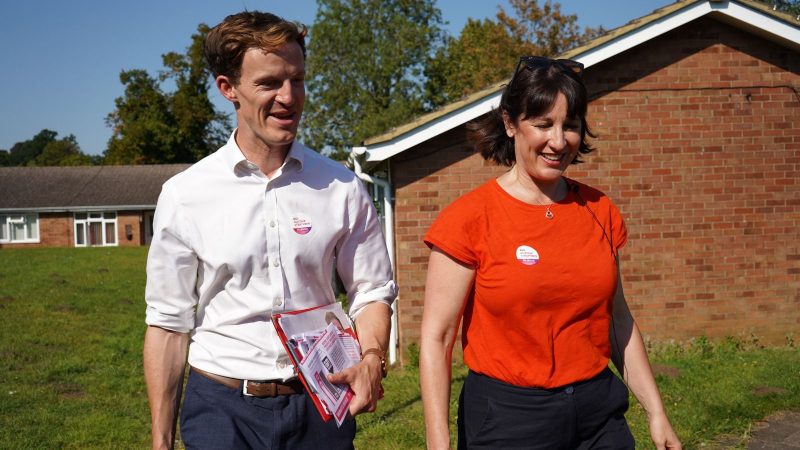
Labour’s candidate in the Mid Beds by-election has said every last phone call supporters make on polling day could be crucial, with the contest likely to “come down to the wire”.
In an interview with LabourList on the eve of the contest, Alistair Strathern highlighted a recent poll showing Labour and the Tories neck and neck on 29%, and told readers it was not too late to join the party’s ‘polling day ring-a-thon’ from 10am to 8pm on Thursday.
He said overturning the Tories’ 25,000-vote majority would be “historic” and show there are “no no-go areas” for Labour, as they have held the seat since 1931 and Labour has never won it since its creation.
Door-knocking on one of the largely rural seat’s many new-build housing estates, he said Tory support had “collapsed, but from a very, very high base”.
“We’ve got a good chance here of pulling it off, but it is going to come down to the wire. There’ll be phone-banking all day, and it won’t just make a difference, it could be the difference – more than any other election I have ever been involved in.
“We’re finding people are still making their mind up; those conversations are proving so valuable giving that last reassurance we’re the right choice and the choice that can win. Every voter we can speak to could be what put us over the top come the early hours of Friday morning.”
He said that just that morning he secured one previously undecided voter’s support, as they had seen polls showing Labour “neck and neck” with the Tories and were impressed by the regular Labour contact.
‘Betrayed’ Tory voters required an ‘unconventional campaign’
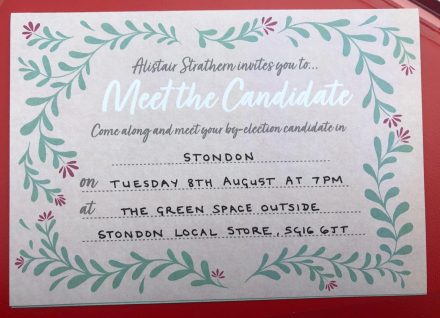
Joining Strathern on the doorstep was shadow minister Peter Kyle, who has played a key role in co-ordinating the campaign.
Kyle agreed that the community had “made its mind up” on the Tories.
But huge numbers of voters feel so “betrayed” by Nadine Dorries and Boris Johnson that they may “no longer believe a word any politician says”, he adds, posing a challenge for opposition parties.
That context has prompted a far more “accessible”, “empathetic” and positive-focused Labour campaign than parties typically run in by-elections, “respectful that a community’s been beaten up by bad politics”.
“This is an incredibly unconventional by-election, and we’re the only party running an unconventional campaign,” Kyle says.
“It’s a credit to Keir Starmer’s Labour Party that we came here and listened very deeply to what residents were telling us; we went and designed a campaign that met them where they are.
“We’ve set about showing them the best is possible, with a local, hard-working, energised and totally committed MP and party that’s respectful of their own political history.”
Soapboxes on the village green
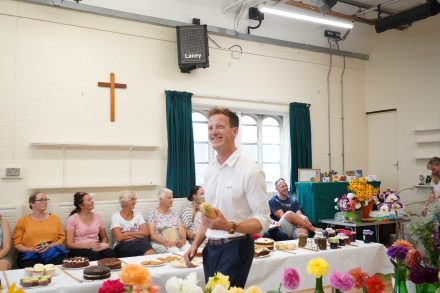
Firstly, Strathern has been fielding public questions at three open meetings a week at village greens or halls. He has worked his way round all the seat’s villages.
The message is that “I’ve been an accessible candidate so I’ll be accessible to you” as an MP, Kyle says. The subtext is a contrast to Dorries, who has been widely criticised for not being in her constituency more.
The invitations to some events look more like wedding or summer party invites than political campaign materials.
While Kyle emphasises Labour leaflets are more explicitly party-branded than some rivals, to avoid exacerbating voter scepticism, many leaflets and posters have far less of the colour red than typical Labour materials nationally.
Campaigners have worked particularly hard to get signs up “everywhere” of Strathern’s face, and highlighted his local links having grown up in the seat.
‘We’re not attacking the Tories – they’re doing it for us’
Secondly, while some rival parties’ campaigns have resorted to “attack, smear, innuendo” and leaflets containing “complete fiction”, Kyle says Labour leaflets are not even mentioning the Tories or the Lib Dems.
“We’ve done zero attacks on the Tories, as they’re doing that for us.”
The fact voters themselves are bringing up issues like getting NHS appointments, soaring mortgage costs – in a seat with a high number of mortgage holders – means “we don’t have to point that out… or dwell on the negative”.
He adds: “Normally in the heat of a by-election campaign, every party’s piling in and you’re usually beating voters over the head with messages about how unfit your opponent is.
“Here you’ve got the Tories trying to run an Uxbridge campaign, trying to find one issue and scare voters, and the Lib Dems are trying to run a Somerton and Frome campaign.
“Labour’s the only one running a Mid Bedfordshire campaign, based on trying to attract people to vote for us and a desire for a better way forward.”
Restoring trust through realistic pledges – and deadlines
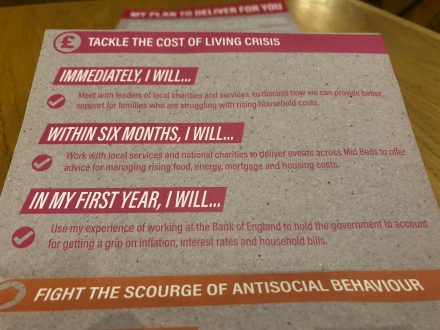
Activists have “trusted residents when they tell us they’ve left the Tories”, and instead focused on making their case that “Keir Starmer has changed the party, that Labour’s values are synonymous with what most people associate as British values”.
Crucially, Labour has “built this campaign entirely on the character and work ethic of Alistair Strathern, of whom we are all immensely proud”.
“We’re making a series of promises about what Ali can realistically do as an MP,” he says, unfolding a leaflet.
Perhaps aiming to tackle cynicism about politics as well as Dorries, the leaflet includes pledges with unusually detailed timeframes – immediately, in six months time or in a year.
The leaflets are something voters can keep to “hold him to account”, with Strathern “asking to be performance-managed by the community”.
Broad themes include tackling the cost of living, “a local doctor and dentist when you need it”, fighting the “scourge of antisocial behaviour” and “no new-builds without proper infrastructure”.
While “all” voters will approach the election differently, the fact a general election is looming means some voters will “feel enabled to vote differently knowing they can change their mind next year” if they decide Strathern isn’t who he told them he’d be, he adds, joking it can be a “fling not a marriage”.
Rural seat sees cars become ‘RAF-style’ mobile campaign centres
The nature of the large constituency, spread across dozens of villages and small towns rather than being centred around one large urban area, forced a rethink of the basics of campaigning too.
Rather than basing activity around one control centre, volunteers and staffers are instead using their cars as well-equipped “mobile campaign centres” with all the materials they need. After team daily early meetings, they “take off in their cars like an RAF squadron taking off for battle”, Kyle explains.
The large rural constituency and many volunteers arriving by train also mean another part of the operation is “like a taxi service”, ferrying them from stations to canvassing sessions.
“This is not like anything we’ve had to do before, but the party adapted in a heartbeat.”
‘We have never won here’
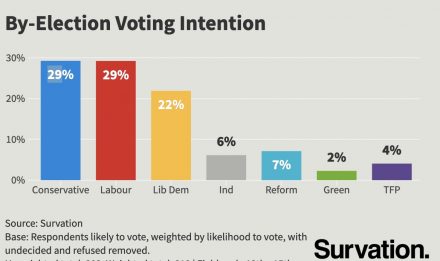
While some in the media are casting both by-elections as Labour’s to lose, campaigners emphasise just how big a mountain the party is seeking to climb.
The Tories had a majority of 24,664 at the 2019 election, taking 59.8% of the vote against Labour’s 21.7%.
“We ask Labour volunteers to think – what would it take to get them to vote Tory. Every day we’re speaking to people making that journey from Tory to Labour, and being respectful that it’s a big thing,” says Kyle.
Strathern says: “Winning here would be historic – we have never won here.”
But he suggests the wider ramifications of a win would be huge. “It would show the changes we’ve been making as a party are cutting through, and that there are no no-go areas for us. It’s such a powerful message going into an election that there’s value in going everywhere.”
It will send a particularly strong message in “areas that encompass rural communities, that we’ve got a really valuable and successful offer here now – and got a great chance”.




More from LabourList
Reeves bets on patience over populism
‘Energy efficiency changes must work for older private renters’
‘Labour’s creative destruction dilemma’